Katey Schultz's Blog, page 8
July 14, 2015
Revising the Novel: Crisis of Faith
 {source}Even when people tell you a particular challenge is perfectly normal, it can still feel like one heck of a rock-your-boat experience. I can certainly say as much for my fifth revision of the novel. While I'd received clear and helpful feedback from an editor I hired for a "one pass" reader's response and I'd received positive encouragement from my writing friend across the river, little did I know that the hardest challenge still remained:
{source}Even when people tell you a particular challenge is perfectly normal, it can still feel like one heck of a rock-your-boat experience. I can certainly say as much for my fifth revision of the novel. While I'd received clear and helpful feedback from an editor I hired for a "one pass" reader's response and I'd received positive encouragement from my writing friend across the river, little did I know that the hardest challenge still remained:the crisis of faith.
I'm not talking about giving up on the novel. I'm not talking about not believing in it as a whole. I'm not even talking about writer's block (which, as it happens, I don't believe in). What I'm talking about is reaching that critical mass of realizations that knock on your subconscious so loudly that, despite determination and deadlines, you simply cannot continue on you current path of revision.
This is a difficult experience to gauge. Did I feel I had to stop the 5th revision in its tracks because I was just being lazy? Because I would rather be writing about bourbon? Because I booked my schedule too full for the next six months? Because we've had a series of financial setbacks? Because I'm newly married and thinking about "the big future" in really different ways? Because I don't have the skills to write what needs to be written?
These are all questions that crept into my mind last week during my crises of faith. In the end, what I decided is that the real reason I had to stop the 5th revision in its tracks is because of a craft issue. This card, "the craft issue card," is the ultimate trump--meaning that, above all else, when you play this card, you really know you're heading into game-changing territory.
The game-changer for me has to do largely with the Afghan narrative thread of my novel. Even though I'd written my most recent draft as deftly and tightly as I felt I could by May 1st (to hand it over to the editor), just five or six short weeks later and I'm already seeing where major chunks of the story and character arcs come up short. That's a good thing and also slightly terrifying. But try as I might, the longer I ignored the realizations that were stacking up, the harder and harder it became to make any revisions with true heart. Another way to say that is that my heart wasn't in it, and when I asked myself "why," I could only accept the truth: The changes needed in the Afghan narrative are so pervasive, revising on the "old path" of insights I'd been working with seemed moot. I might have added 10,000 new words to my manuscript in the last four weeks, but if I kept going, I feared I'd make a bigger mess in the end.
To be clear, I do not take this decision lightly. After all, I'm a big fan of pushing through the tough stuff and writing your way through the mess (and even making things messier). This is because, as all writers know, it's often those messy moments that crack something open for us, revealing what we've been trying to say all along. If we never allow ourselves to write those messes, we'll never discover the gems.
This crisis was something different, though--something fundamental. I'm reading Lisa Cron's craft book Wired for Story and, like Jeff Vandermeer's Wonderbook before this, it's proving persuasive. I feel empowered by Cron's book, if not also a bit overwhelmed. But at least she's helping me map a way forward. In the coming weeks, I hope to be able to share specific character arc and plot issues her book has helped me identify, as well as how I intend to address those issues. I'm still articulating it all for myself, but rest assured that once I can put my finger on the precise issues, I'll name them here and share whatever learning I can. Meantime, back to "revising"--which right now means reading Wired for Story, freewriting in my journal every morning, and trying to be patient with my imagination.
Published on July 14, 2015 05:00
June 19, 2015
Literary Citizenship: Point and Counterpoint
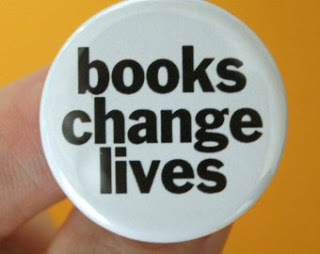 {source}One afternoon during this year's Writers Retreat, author Patricia Ann McNair led a round table discussion on literary citizenship. This broad subject can pertain to anything from ways to tactfully promote and endorse the work of others in public forums, to ways to support individual writers in their unpublished endeavors at the desk. In the spirit of summary, I thought I'd share a few finer points from the discussion:
{source}One afternoon during this year's Writers Retreat, author Patricia Ann McNair led a round table discussion on literary citizenship. This broad subject can pertain to anything from ways to tactfully promote and endorse the work of others in public forums, to ways to support individual writers in their unpublished endeavors at the desk. In the spirit of summary, I thought I'd share a few finer points from the discussion:If you're in a book club, suggest a friend's book that you know and/or organize a "meet the author" event with several book clubs and have the author Skype in or meet folks in person. Keep in mind that this is often "unpaid work" the author offers, so make the time worthwhile by having a good crowd, offering a meal, preparing the group with background on the author, or tapping into the group members' skill sets (ex. if someone in the book club works for a newspaper, see if they can get the author's book reviewed or listed in an article somehow). This takes time and if you're in a book club but pressed for time, there's still one simple thing you can do: remind each member of your book club to write Amazon and Goodreads reviews of the work. This helps tremendously!
If you buy used books, especially via Amazon, then consider that you can balance the karmic scales (buying books is good, and Amazon is practical, but authors get no money from used book sales) by writing a review of the book on Amazon and Goodreads in the very least. This helps "pay it forward" in more ways than you can imagine.
Share what you are reading with others in clever ways, such as posting a fave sentence as a status update on Facebook, using the "I just bought this book" icon when you make online purchases (which often links your activity purchase to your social media accounts, spreading the word), or Tweeting "at" the author with a thanks or a fan note. This can make someone's day, expose the author to an audience she or she may otherwise never have reached, and--above all else--uplift the "social media chatter" from pet pics and complains to something more inspiring, such as a beautiful sentence from a character.
Read the book in public places, with the cover visible and a smile of literary satisfaction painted across your face. :-)
Buy books as gifts and buy from multiple places. Not everyone can afford first edition hardbacks in new condition, and that's fine. But when you do purchase, review those books and vary where you make purchases--some online, some from indy booksellers, and some from the author him/herself if that is also an option. If you already have a copy of your fave book and you see the author at an event, so what? Buy another copy. Chances are good that within the next few months, you'll find a holiday or occasion to give this book to someone as a gift and brighten their day.
Ask for the book at your local library, even just by calling them on the phone and asking them if they can get it in stock so you can check it out. Whether or not you end up actually checking it out is beside the point (because hopefully you already have your own copy), but just know that if every library in the country stocked 1 copy of an author's book, that book would be listed as a "bestseller." No joke.
Attend events for free and bring a friend or date with you, when possible. These events are hard on authors. They're delightful and helpful, too, but they're unpaid work and writers are often spending money out-of-pocket just to get to an event. Even if you can't afford to buy a copy of the book, you can be a warm body in the room, you can ask 1 question, and you can bring a friend. All of this is free, enjoyable, and absolutely in the spirit of literary citizenship.
All that being said, check out this counterpoint to the literary citizenship model, which looks at the origin of the need in the first place.
Published on June 19, 2015 05:00
June 16, 2015
Revising the Novel: An Excerpt
 {source}I had the distinct honor of reading alongside award-winning novelist Mary Kay Zuravleff last night. Although Flashes of War was for sale on the book table, I knew instinctively that this year it was time to read something different. At this retreat in particular, the audience members are receptive to new or in progress work. In fact, in many ways they leap at the chance to hear such work because they, too, are each heavily involved in creating new work. It felt right to meet them halfway and offer my own drafts. After days of minor worry and then an afternoon of trepidation and last-minute revising and rehearsing, I settled on reading Chapter 8 from the novel. Although I felt nervous at the podium and told the audience as much, once I got going with the momentum of the piece, the nervousness dissipated. Walking back to the cabin afterwards, it occurred to me that the novel felt suddenly real--like a living thing readying to meet the world. I'll share the opening paragraphs here:
{source}I had the distinct honor of reading alongside award-winning novelist Mary Kay Zuravleff last night. Although Flashes of War was for sale on the book table, I knew instinctively that this year it was time to read something different. At this retreat in particular, the audience members are receptive to new or in progress work. In fact, in many ways they leap at the chance to hear such work because they, too, are each heavily involved in creating new work. It felt right to meet them halfway and offer my own drafts. After days of minor worry and then an afternoon of trepidation and last-minute revising and rehearsing, I settled on reading Chapter 8 from the novel. Although I felt nervous at the podium and told the audience as much, once I got going with the momentum of the piece, the nervousness dissipated. Walking back to the cabin afterwards, it occurred to me that the novel felt suddenly real--like a living thing readying to meet the world. I'll share the opening paragraphs here: Excerpt from STILL COME HOME, a novel-in-progress, Chapter 8:
It’s another fetid sunset—this one orange, molten—and Nathan watches from the high perch of a security tower, sunlight seeping across the city as if from a wound. A small headache balls at the base of his skull. Block by block, the city fades into shadows. Airborne particles of sand catch the sun’s rays, mother nature’s tracer fire. Within minutes, the horizon appears lit by a throbbing Armageddon. Four tours and it has come to this: the night before Spartan’s last mission outside the wire. Nathan has gotten them this far, though previous tours came splattered with explosions that reduced his fellow soldiers to bits: a leg, a torso. One time, a gunner’s nose and ear blown right off his face from the force of a blast. Mr. Potato Head, Nathan remembers thinking, I need Mr. Potato Head and his bucket of parts.That’s how the mind works in such moments. Twisted, private humor, like a teen jerking off in his parents’ bed. A curious sickness that makes Nathan shrink in shame and feel charged with life all at once. The nose went one direction. The ear went the other. The memory almost makes him laugh out loud. Before he knew it, he had applied well-aimed, direct pressure to the wounds, then Doc took over. Next, he wiped his hands on his DCU’s and high-tailed it to the two insurgents his men cuffed. He could have killed them, but of course he didn’t—the two of them kneeling at his boots with bags over their heads, one just having shat himself and the other wailing some tinny, syllabic prayer.Nathan moves from the tower, the clap of his boots echoing down the stairs. His own feet walking. His own breath quick across his lips. For quite some time, he has experienced himself as if from outside of himself, an entertaining little mindfuck, though the jury’s still out on whether this renders him more effective against the enemy. In either case, there’s no time to find out. He crosses the courtyard, returns a few salutes to new recruits in line outside the phone center, and flashes for a moment on his wife Tenley. He really ought to call. Then it’s onward toward the staging area and there, at the end of a long row of concrete bunkhouses, Nathan spies Spartan gathered around their Humvees for a mission debrief before chow.They haven’t noticed him yet. He can’t even hear himself approach; bunkhouse air conditioners humming like spacecraft, as if this whole tour has been an alien invasion. Exhaust swirls in Nathan’s face and he walks down the corridor, flashing between slanted bunkhouse shadows and angled light. It could be Kansas. It could be Oz. It could all be about to blow away. Laughter breaks through the pasty air and Nathan recognizes First Sergeant Pilchuck’s snare-drum bray, a natural leader and the platoon is better for it. Pilchuck. Upchuck. Everybody calls him Yak. Around Yak, nine more Spartans wrestle and juke like Olympians before their next heat. Nathan is determined to get his men through this final mission, the weeks of paperwork, then homeward bound. The smell of diesel fumes hits him and his throat tightens, the human body so needy, so easily rattled. It’s all a wonder as he steps through the last patch of shade into the bright, final seconds of daylight unreeling from that goddamn-ever-racing-sun.
Published on June 16, 2015 05:00
June 12, 2015
Interlochen Writers Retreat
 What a line-up!Just twenty-four hours from now, I get to fly to one of my favorite, creative places on the planet: Interlochen Center for the Arts. Readers of The Writing Life will know I've been there many times before, in various capacities. The notable facts about this upcoming journey are that I'm in my 5th year as Artistic Director for the annual Writers Retreat and am very proud to say that we are booked full to capacity at 48 participants, with waiting lists for every class--for the first time in 10 years. After a lot of digging around and brainstorming this winter, paired with productive phone conferences with the delightful Director of Interlochen College of Creative Arts, we were able to tweak marketing and programming needs in all the right ways. I'm overjoyed that this program is full, because in my (biased but humble) opinion, it offers several unique features writers attending other conferences will be hard-pressed to find.
What a line-up!Just twenty-four hours from now, I get to fly to one of my favorite, creative places on the planet: Interlochen Center for the Arts. Readers of The Writing Life will know I've been there many times before, in various capacities. The notable facts about this upcoming journey are that I'm in my 5th year as Artistic Director for the annual Writers Retreat and am very proud to say that we are booked full to capacity at 48 participants, with waiting lists for every class--for the first time in 10 years. After a lot of digging around and brainstorming this winter, paired with productive phone conferences with the delightful Director of Interlochen College of Creative Arts, we were able to tweak marketing and programming needs in all the right ways. I'm overjoyed that this program is full, because in my (biased but humble) opinion, it offers several unique features writers attending other conferences will be hard-pressed to find.If you're in the area, several events at this retreat are actually free and open to the public. These are inspiring, thorough, and worth the drive. All events take place in the Writing House on the campus of Interlochen Center for the Arts. Free entry, free parking, with book sales and signings to follow. Please consider joining me for:
A public reading by award-winning authors Mary Kay Zuravleff and Katey Schultz. Mary Kay will read from her latest novel, Man Alive!, and Katey will read for the first time from her novel-in-progress. Join us at 7:30pm on Monday, June 15.A public reading by authors John Mauk and Holly Wren Spaulding. John will likely read new, award-winning fiction following the release of his first book, and Holly will read from her incredible selection of poems in Pilgrim. Join us at 7:30pm on Tuesday, June 16.A public reading and celebration for author Anne-Marie Oomen, whose fifth book released in April to great success. She will read from Love Sex & 4-H and will not disappoint. Join us at 4:15pm on Wednesday, Jun 17.Another reason I'm so excited for this event, despite the fact that I hate leaving my newlywed husband behind for 8 days, is that it represents the friendliest, most grateful group of literary folks I have ever encountered. Time and again, the writing community that gathers in Michigan (largely through National Writers Series and Michigan Writers) and at this Writers Retreat in general, wins on all accounts when it comes to friendliness. And I'm not talking about the kind of "self-licking ice cream cone" friendliness that feels like a pat on the back for a sentence well-written. I'm talking about genuinely kind people who want to show up, try hard, do the work, and make connections with well-meaning people while they're at it. Second, the retreat is generative. No one shows up with their "perfect" novel, shoving it under noses, searching for an agent. There are other places for that. Here, writers with in-progress projects or first-time blank pages show up for craft talks, prompts, and new writing all in the spirit of discovery. A writer three drafts into her novel may come away with keen insights about her protagonist, thanks to a writing exercise or break-through insight during a craft talk. A beginner with loose ideas for a memoir may discover a powerful theme in his work, remember something from childhood long-ago thought lost, and even learn about a new literary magazine open to submissions. The possibilities are many and the feeling in the air all week long reflects this.
I can't wait to arrive...
[Curious for more? Interlochen has added a special "5th day" to the Retreat called a Practicum, which focuses on publishing. It's only $35 for the day and there are spaces available. Info here.]
Published on June 12, 2015 05:00
June 9, 2015
New Short Story Published: Excerpt
 Wallowa Mountains, OregonI'm delighted to share this news and link with you today, via the very fine literary publication, Consequence Magazine. From the notes on their website, Consequence is an "international literary magazine published annually, focusing on the culture and consequences of war." Their editor reached out to me a while back, seeking new work. I was delighted to share my short story "What the Water Teaches" with her, and although I wrote it before Flashes of War, to me it represents one of my more heartfelt explorations of writing about place.
Wallowa Mountains, OregonI'm delighted to share this news and link with you today, via the very fine literary publication, Consequence Magazine. From the notes on their website, Consequence is an "international literary magazine published annually, focusing on the culture and consequences of war." Their editor reached out to me a while back, seeking new work. I was delighted to share my short story "What the Water Teaches" with her, and although I wrote it before Flashes of War, to me it represents one of my more heartfelt explorations of writing about place.I set the story in an imaginary county in Eastern Oregon, inspired by Wallowa County (a place near and dear to my heart). I wrote the story in Oregon during the spring of 2011 while in residence with Fishtrap, splitting time between the tiny towns of Joseph and Imnaha, chasing a love that had died, eating lots of Arrowhead Chocolates, accruing rejections for Flashes of War by the dozens, and growing firm in my belief that--no matter what else came my way--I would be perfectly content to write stories for the rest of my life. I hiked, ran, and pedaled daily through the slopes around Hell's Canyon and the high peaks surrounding Wallowa Lake. I leaned on friends for inspiration and advice. And I kept writing. It was one of the quietest, freest, deeply introspective periods of my life (second only to working on Flashes of War in Alaska). I was lucky to have it.
I have three or four stories from before Flashes of War that include scenes during the Vietnam War. "What the Water Teaches" is one of them. The inclusion of the Vietnam War helped my story align with Consequence's mission, but what strikes me most about the experience I had writing this story is that it enabled me to truly experiment with landscape. Little did I know that my main character's connection to that Wallowa-inspired Oregon landscape would come into play many years, scenes, and pages later in the story when he makes it to Vietnam. More than anything, I felt that this narrator's relationship to the land was what was going to save him, even halfway across the world in an entirely different ecosystem. Read to the end of the story, and you'll find out whether or not it did...
Use this link for the free excerpt, and this link to purchase the full issue. (I'm in this issue with some really heavy hitters, folks--it's well worth the $10--and I'm honored to be in their company.)
Published on June 09, 2015 05:00
June 5, 2015
Revising the Novel: Compressing Plot
I've never been one for shoot 'em ups. No high speed car chases. No murder mysteries or psychological thrillers. Books, movies--across the mediums--I just don't feel a sense of satisfaction reading genre fiction or watching most action movies. But if I look past my biases and a little closer at what's working in these forms, I see that my work as a novelist can benefit.
What's really at stake during a high speed car chase? Well, sure, the hero has to prove his love, dodge the bad guys, get the money, avoid jail, and look good while doing it. But beneath that layer, what's really happening is that there's too much being shoved in the character's face all at once. We, as readers or viewers, get a thrill because we "can't believe" a character pulled something off. ("Did you see that bus? He almost hit it!...I can't believe his car jumped that ravine!") There's no reason literary fiction authors can't, or shouldn't, attempt to zero in on high stakes, too.

High stakes is subjective, of course, but if a writer has painted his or her characters in three dimensions, it doesn't matter if our "hero" is James Bond or Joe Schmoe. Because everyone knows Joe Schmoe has problems, too, right? He's got bad days and good days. And he definitely knows about unrequited love. Maybe he buttons his shirt wrong, gets a parking ticket, and spills a drink onto a girl's lap all in the same day--that's not high speed, but it's compressed. And not only that, for Joe Schmoe (who suffers from anxiety, whose mother has dementia, who is terribly bright but no one can see it), having the buttons misaligned on his shirt is just as mortifying as James Bond hitting that bus.
But wait--you say--James Bond never hits the bus. Exactly. Which is why the realist in me walks out of the theatre after too many hero victories and close calls, but keeps reading when Joe buttons his shirt wrong and gets to work on time anyway, blathering through his day, just trying to get the world to give him a break.
A little Bond. A little Schmoe. It's all about balance, and as I'm revising the novel with my editor's and mentor's advice in mind, I can see more and more that there's value to cramming things together. When we put our characters up against the wall, bullying them with tiny insult after tiny insult, that has the same effect of a train rumbling down the tracks toward the woman tied at the other end. The reader senses the momentum, feels the infelicities accruing, knows there won't be any way out...yet they have to keep reading. They have to know what happens to Joe before the day ends. Give Joe too much breathing room or give him only one challenge at a time, and the narrative tension grows slack.
What's really at stake during a high speed car chase? Well, sure, the hero has to prove his love, dodge the bad guys, get the money, avoid jail, and look good while doing it. But beneath that layer, what's really happening is that there's too much being shoved in the character's face all at once. We, as readers or viewers, get a thrill because we "can't believe" a character pulled something off. ("Did you see that bus? He almost hit it!...I can't believe his car jumped that ravine!") There's no reason literary fiction authors can't, or shouldn't, attempt to zero in on high stakes, too.

High stakes is subjective, of course, but if a writer has painted his or her characters in three dimensions, it doesn't matter if our "hero" is James Bond or Joe Schmoe. Because everyone knows Joe Schmoe has problems, too, right? He's got bad days and good days. And he definitely knows about unrequited love. Maybe he buttons his shirt wrong, gets a parking ticket, and spills a drink onto a girl's lap all in the same day--that's not high speed, but it's compressed. And not only that, for Joe Schmoe (who suffers from anxiety, whose mother has dementia, who is terribly bright but no one can see it), having the buttons misaligned on his shirt is just as mortifying as James Bond hitting that bus.
But wait--you say--James Bond never hits the bus. Exactly. Which is why the realist in me walks out of the theatre after too many hero victories and close calls, but keeps reading when Joe buttons his shirt wrong and gets to work on time anyway, blathering through his day, just trying to get the world to give him a break.
A little Bond. A little Schmoe. It's all about balance, and as I'm revising the novel with my editor's and mentor's advice in mind, I can see more and more that there's value to cramming things together. When we put our characters up against the wall, bullying them with tiny insult after tiny insult, that has the same effect of a train rumbling down the tracks toward the woman tied at the other end. The reader senses the momentum, feels the infelicities accruing, knows there won't be any way out...yet they have to keep reading. They have to know what happens to Joe before the day ends. Give Joe too much breathing room or give him only one challenge at a time, and the narrative tension grows slack.
Published on June 05, 2015 05:00
June 2, 2015
Revising the Novel: Grinding it Out
I've got the structure and plot of the novel down. I could feel it when I submitted it to the editor I've hired and she agreed. It took a solid year to get it from various character threads that moved through time and action, into a story that touches on thematic concerns, contains character arcs, and creates a sense of rising tension and resolution. (And of course, it took 2 years of work prior to that, too.) Not all those things are firing on all cylinders yet, but they're there. Working together. Thank goodness.
My next deadline is already around the corner: July 10th. Less than six weeks away, I'm going to attempt to start and complete my 5th revision of the novel during this tight timeframe for several reasons. First, I've been empowered by my novelist writing friend Abigail. She read my editor's feedback and much of it settled on her the same way it settled on me (in other words, the feedback felt mostly right, with the exception of a few stylistic differences of a opinion and a tad more willingness to break the "norm"). Although we both had similar impressions of the critique, the difference between me and Abigail is that she actually knows what steps to take next in response to that impression. She's a graduate of the "best" fiction writing program in the United States (Iowa--of course--albeit a few decades ago), has written and published two novels, and is a tenured creative writing professor whose career encourages her to think about these sorts of things deeply and critically. Between the great input I received from the editor and Abigail's go-get-'em attitude, I agreed to grind out the pages to the best of my ability between now and the deadline.
Four days into revisions, I'm thrilled to report that I can finally feel that momentum and lightness across the keyboard that I've heard other novelists describe to me. "Just grind it out," or "Just get in there and start throwing stuff around," or "Who cares if it comes out i order or not, just do it!" are all things I've heard for years...and never, ever been able to get behind experientially. Not with full-length work, in any case. In general, I write slowly. This has never bothered me, because I know that the outcome will be strong. I may spend 2-4 hours at the desk and get only 200-800 words, but I'm also not going to write 14 drafts. Not even 10 drafts. Probably not even 6 drafts. Perhaps that's a nice skill to have in this writing life, but when it comes to the novel, I have to confess that my slow pace had me wondering whether I was even capable of feeling that rush of the story tugging my fingers along.
It helps to wake up at 4:30 or 5:50 in the morning. I never attempt this during wintertime (more like 7am, that season), but ever since Brad and I returned from our honeymoon on West Coast Time, I've continued to wake earlier and earlier. It makes for some sand-baggy afternoons, but if that's the only side effect in trade for stellar writing mornings, I'll take it. Over the course of this weekend, I added 3,000 words to my barely 60,000 word manuscript. A pretty good percentage increase...and I did this mostly by simply letting my scenes (and dialogue) expand. Thanks to the feedback from the editor, and thanks to being freed from the mental focus required to get the story's structure down in the first place, I can now "get in there and start throwing stuff around." I look at the scene. I see where it falls short or leaves the reader with a less-than-satisfactory impact. And I make something happen. No shoot 'em ups. No blood knives tossed into the bushes. Just pure and simple characterization...people talking, moving, reacting, and interacting with each other and the world around them.
Damn, this feels good.
My next deadline is already around the corner: July 10th. Less than six weeks away, I'm going to attempt to start and complete my 5th revision of the novel during this tight timeframe for several reasons. First, I've been empowered by my novelist writing friend Abigail. She read my editor's feedback and much of it settled on her the same way it settled on me (in other words, the feedback felt mostly right, with the exception of a few stylistic differences of a opinion and a tad more willingness to break the "norm"). Although we both had similar impressions of the critique, the difference between me and Abigail is that she actually knows what steps to take next in response to that impression. She's a graduate of the "best" fiction writing program in the United States (Iowa--of course--albeit a few decades ago), has written and published two novels, and is a tenured creative writing professor whose career encourages her to think about these sorts of things deeply and critically. Between the great input I received from the editor and Abigail's go-get-'em attitude, I agreed to grind out the pages to the best of my ability between now and the deadline.
Four days into revisions, I'm thrilled to report that I can finally feel that momentum and lightness across the keyboard that I've heard other novelists describe to me. "Just grind it out," or "Just get in there and start throwing stuff around," or "Who cares if it comes out i order or not, just do it!" are all things I've heard for years...and never, ever been able to get behind experientially. Not with full-length work, in any case. In general, I write slowly. This has never bothered me, because I know that the outcome will be strong. I may spend 2-4 hours at the desk and get only 200-800 words, but I'm also not going to write 14 drafts. Not even 10 drafts. Probably not even 6 drafts. Perhaps that's a nice skill to have in this writing life, but when it comes to the novel, I have to confess that my slow pace had me wondering whether I was even capable of feeling that rush of the story tugging my fingers along.
It helps to wake up at 4:30 or 5:50 in the morning. I never attempt this during wintertime (more like 7am, that season), but ever since Brad and I returned from our honeymoon on West Coast Time, I've continued to wake earlier and earlier. It makes for some sand-baggy afternoons, but if that's the only side effect in trade for stellar writing mornings, I'll take it. Over the course of this weekend, I added 3,000 words to my barely 60,000 word manuscript. A pretty good percentage increase...and I did this mostly by simply letting my scenes (and dialogue) expand. Thanks to the feedback from the editor, and thanks to being freed from the mental focus required to get the story's structure down in the first place, I can now "get in there and start throwing stuff around." I look at the scene. I see where it falls short or leaves the reader with a less-than-satisfactory impact. And I make something happen. No shoot 'em ups. No blood knives tossed into the bushes. Just pure and simple characterization...people talking, moving, reacting, and interacting with each other and the world around them.
Damn, this feels good.
Published on June 02, 2015 05:00
May 28, 2015
Wedding Whirlwind Photos
The wedding went off "without a hitch," as they say, and Brad and I are still soaring from the love, support, and blessings of community that gathered to witness and celebrate our marriage. Our photographer Nancy Smith is a hiking club friend who has a true gift. She understood and intuited the spirit of each moment, and captured it.
It's impossible to recreate the energy of the weekend--from a bachelorette party with 6 of my most influential women friends across my lifetime, to a rehearsal dinner of 80+ friends and family for a giant game of trivia, to the wedding ceremony and poem that moved us all, to the brunch and parties afterwards that went on, and on, and on...
But I can say this: My mother did the most incredible job planning the day. We succeeded in our goal of creating a community-centered weekend that maintained the perfect balance of formal and silly, mountain and momentous. We had kazoos and sparklers, but also champagne and a moment of silence. We had delightfully inappropriate (and therefore appropriate) jokes and moshing, as well as a traditional First Dance and a line of strapping men in kilts.
Here are a few photos from the wedding--though there was so much before and after, it's quite challenging to select images. For live action, don't miss this video of the most ridiculous dad/daughter dance ever. I'm biased, but truly--Nirvana and Madonna? Yes. It can be done.


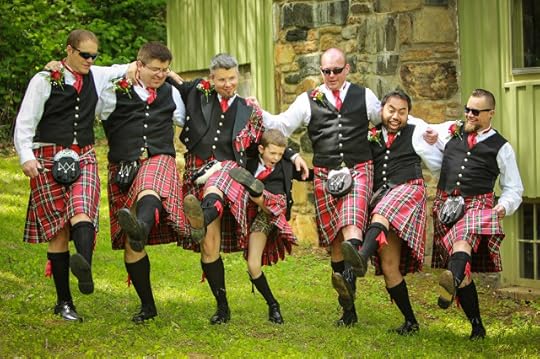

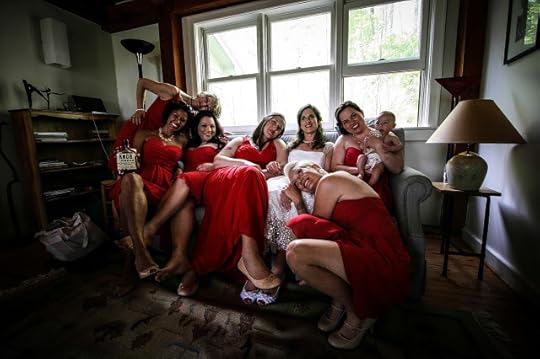


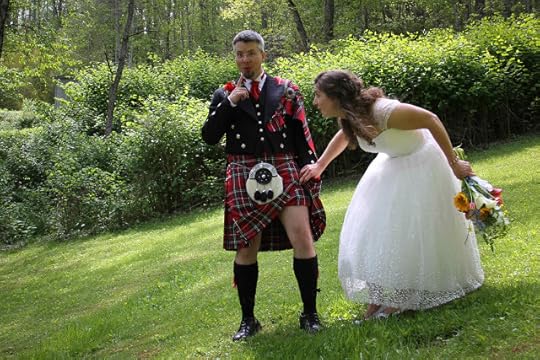

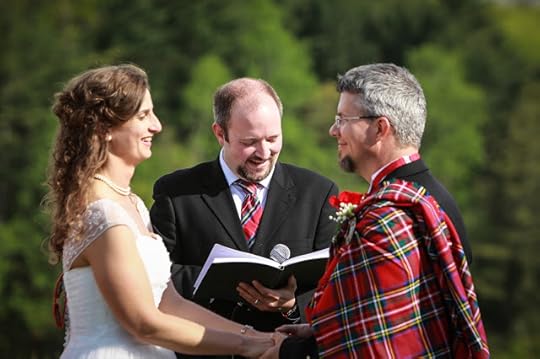



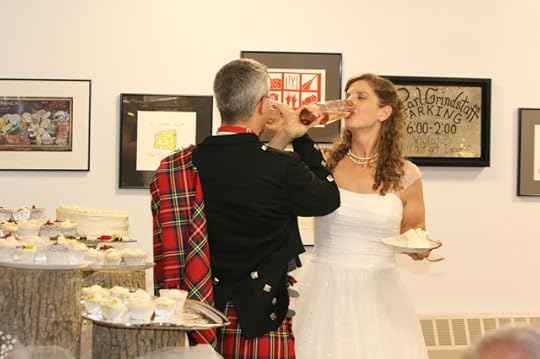
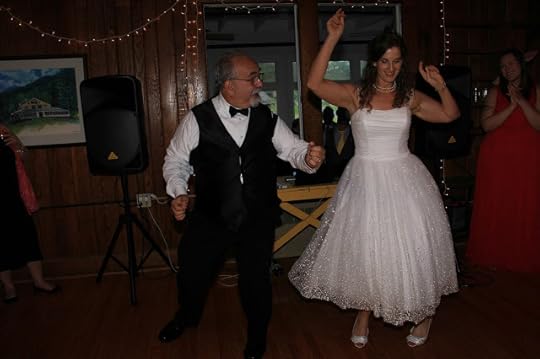


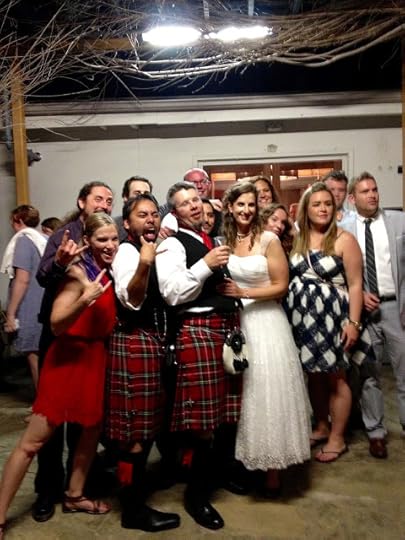



If you're a sucker for weddings in general, or super interested in seeing more of Nancy's fine work, you can use this link to access the "Top 100" images from the wedding day itself, this link for goofy bios of our best friends (wedding party), and this link to see the house rental we were given as a gift by our cousins Joe and Haven (who own the rental).
Thanks for indulging me...and now, back to regularly scheduled writing life programming!
It's impossible to recreate the energy of the weekend--from a bachelorette party with 6 of my most influential women friends across my lifetime, to a rehearsal dinner of 80+ friends and family for a giant game of trivia, to the wedding ceremony and poem that moved us all, to the brunch and parties afterwards that went on, and on, and on...
But I can say this: My mother did the most incredible job planning the day. We succeeded in our goal of creating a community-centered weekend that maintained the perfect balance of formal and silly, mountain and momentous. We had kazoos and sparklers, but also champagne and a moment of silence. We had delightfully inappropriate (and therefore appropriate) jokes and moshing, as well as a traditional First Dance and a line of strapping men in kilts.
Here are a few photos from the wedding--though there was so much before and after, it's quite challenging to select images. For live action, don't miss this video of the most ridiculous dad/daughter dance ever. I'm biased, but truly--Nirvana and Madonna? Yes. It can be done.





















If you're a sucker for weddings in general, or super interested in seeing more of Nancy's fine work, you can use this link to access the "Top 100" images from the wedding day itself, this link for goofy bios of our best friends (wedding party), and this link to see the house rental we were given as a gift by our cousins Joe and Haven (who own the rental).
Thanks for indulging me...and now, back to regularly scheduled writing life programming!
Published on May 28, 2015 05:00
May 26, 2015
Flashes of War Turns Two!
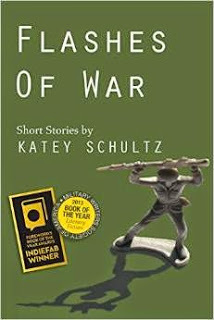 Flashes of War is two years old, today. To my great surprise, I'm happy to report that invitations to read and present at colleges and organizations continue to come my way. It's been a learning experience and wild ride, including lows and highs. None of it would be possible if it weren't for you--darn near every single one of the 8,000 people out there in cyberspace reading this blog every week. Thank you.
Flashes of War is two years old, today. To my great surprise, I'm happy to report that invitations to read and present at colleges and organizations continue to come my way. It's been a learning experience and wild ride, including lows and highs. None of it would be possible if it weren't for you--darn near every single one of the 8,000 people out there in cyberspace reading this blog every week. Thank you.To help celebrate this book's birthday, I'd like to publicly post this call for reviews or ratings on Goodreads and Amazon. It's a small favor that takes a few clicks to complete (or a few more minutes of critical thinking, if you prefer) and will add up to more than you can imagine. These reviews, whether you support book purchases through Amazon or not, add up for authors: publishers, agents, potential employees, and reading series curators sometimes scour these reviews. It's a very boots-on-the-ground way to get a sense for what the general population thinks of a particular author's work and readability. And above all else, your opinion counts! Good, bad, satisfied, or disappointed--I want to know how this book did or did not work for you.
Can you review or rate it for me? Here's how:
Log in to your Amazon account and search for Flashes of War (LINK). Once there, you'll see the small blue number just below the title. Right now it says "64 customer reviews." Click on that, and you'll see a white button about 2/3 of the way down the page that says "Write a Review." Click, rate the book with some stars, and add a line or two of detail (if you prefer). Submit the review (one more button to click) and you're done!Log in to your Goodreads (or create) account and search for Flashes of War (LINK). When you're logged in and have clicked on the book page, you'll see the cover on the left, the purchase options in beige bubbles just below that to the right, and then My Review underneath that. Here, you can click a few stars and be done, and/or also click "Write a Review" and add whatever you see fit.
Thank you so much for your time and help. It really does make a difference!
{PS I've been away for a while...getting married! Pics and videos promised later this week!}
Published on May 26, 2015 05:00
May 1, 2015
Getting Married
I'm getting married in 9 days!
Then, I'm going here:
 {View off main floor deck.}
{View off main floor deck.}
All of which is to say: The Writing Life Blog will be offline May 1 - May 26.
Meantime, my Writer at Large students have filled the docket through the end of the calendar year. But there's spaces for flash fiction and flash nonfiction via...
Get Flashy in July
with 4 prompts, 4 critiques, and sample texts, plusa Google Hangout video bash at the end!Use the link above for details and email me to register.
Stay tuned for pictures, celebration, and of course, more blogging about novel revision, karate, jogging, and all the ins and outs of this grand thing I call The Writing Life.
Then, I'm going here:
 {View off main floor deck.}
{View off main floor deck.}All of which is to say: The Writing Life Blog will be offline May 1 - May 26.
Meantime, my Writer at Large students have filled the docket through the end of the calendar year. But there's spaces for flash fiction and flash nonfiction via...
Get Flashy in July
with 4 prompts, 4 critiques, and sample texts, plusa Google Hangout video bash at the end!Use the link above for details and email me to register.
Stay tuned for pictures, celebration, and of course, more blogging about novel revision, karate, jogging, and all the ins and outs of this grand thing I call The Writing Life.
Published on May 01, 2015 05:00



